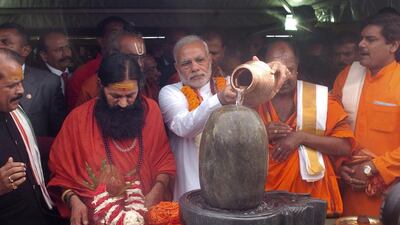NEW DELHI // Prime minister Narendra Modi begins a two-day visit to Sri Lanka on Friday, hoping to woo the island nation away from China’s embrace but also to smooth over diplomatic issues about fishing rights and territorial waters.
Mr Modi, who arrives in Colombo after visiting the Seychelles and Mauritius, will become the first Indian leader – and only the second world leader, after British prime minister David Cameron – to visit northern Sri Lanka since the end of the civil war in 2009. Today the region remains scarred by the conflict.
Between 2009 and 2014, ties between India and Sri Lanka eroded as Mahinda Rajapaksa, the former Sri Lankan president, pivoted towards China, which offered generous seeking financial and infrastructural assistance.
Mr Rajapaksa’s government also began a firm policy of imprisoning Indian fishermen who strayed into Sri Lankan waters. Having won the three-decade war against separatist Tamil guerrillas, the government also rode roughshod over the civil and human rights of Sri Lankan Tamil civilians.
But Mr Rajapaksa was voted out in a January election, bringing the current president, Maithripala Sirisena, to power. Mr Sirisena has been warmer towards Delhi than his predecessor and his first state visit, in mid-February, was to India. The president has said he does not support Mr Rajapaksa’s former policy of favouring one ally, China, over all others, and that India and Sri Lanka have traditionally been close.
No Indian prime minister has visited Sri Lanka since 1987, when Rajiv Gandhi helped establish a short-lived peace accord between Sri Lankan forces and the Liberation Tigers of Tamil Eelam (LTTE) guerrillas. Mr Gandhi was subsequently assassinated by the LTTE in 1991.
Mr Modi is expected to meet Mr Sirisena and prime minister Ranil Wickremasinghe in Colombo. He will also make an address to the Sri Lankan parliament before travelling to Jaffna, in the heart of the Tamil-majority north, to inaugurate a cultural centre that was built with Indian assistance.
Part of Mr Modi’s agenda will be to help India catch up with China as far as influence in Sri Lanka goes. One of his foremost priorities involves the construction of a 500-megawatt thermal power station in the east of the island.
India will also extend a line of credit to Sri Lanka for infrastructure and development, although the government in New Delhi has not revealed further details about this. Last week, India and Sri Lanka agreed to restart a couple of ferry services between the two countries, and to discuss energy cooperation that will harness Sri Lanka’s wind energy.
Peer Mohamed, an independent political analyst based in Chennai, told The National that Mr Sirisena is keen to "win the confidence of India."
“He is trying to distance himself from Rajapaksa, and he promised, in the build-up to the election, that Sri Lanka’s tilt towards China would be checked,” Mr Mohamed said. Part of the reason, he said, was that the people who were backing him, “like Ranil and [the former president] Chandrika Kumaratunga have legacies of looking up to India.”
As a gesture of goodwill, Mr Sirisena on Wednesday ordered the release of 86 Indian fishermen, who had been jailed in Sri Lanka for straying into that country’s waters.
The fishermen were arrested in late February. India’s foreign minister Sushma Swaraj had pressed for their release during her visit to Colombo earlier this month.
But the problem of fishing boats from the Indian state of Tamil Nadu encroaching into Sri Lanka’s waters is a persistent one, said P Rajan, a member of the Alliance for the Release of Innocent Fishermen, an Indian NGO that campaigns for the freedom of fishermen jailed in Sri Lankan jails.
The distance between the southern tip of India and Sri Lanka is so small, Mr Rajan said, “that it is necessary to implement some sort of open waters concept in this area.”
Prime minister Wickremasinghe said last week that Sri Lanka was justified in defending its waters by force.
“If someone tries to break into my house, I can shoot,” he said. “As far as I’m concerned, I have very, very strong lines. These are our waters.”
A deal between India and Sri Lanka will be welcome, Mr Wickremasinghe said. “Let’s have a reasonable deal. But not at the expense of the income of the [Sri Lankan] fishermen.”
ssubramanian@thenational.ae

